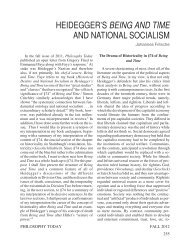SPINOZA'S VIRTUOUS PASSIONS
SPINOZA'S VIRTUOUS PASSIONS
SPINOZA'S VIRTUOUS PASSIONS
Create successful ePaper yourself
Turn your PDF publications into a flip-book with our unique Google optimized e-Paper software.
770 MATTHEW J. KISNER<br />
(3p11s). 27 This is because the power of the mind depends upon representing<br />
the body. 28 Spinoza employs this claim when arguing that, if<br />
the mind stops representing the body, the cause must be some outside<br />
force; this is because nothing can follow from the mind itself which is<br />
contrary “to the idea that constitutes the essence of our mind.” 29 Furthermore,<br />
Spinoza claims that an idea increases one’s mental power<br />
to the extent that it represents increases in the body’s power of activity<br />
(3p11). For instance, our pleasure at receiving the antivenom is active<br />
to the extent that it represents the increase in the body’s power<br />
from the antivenom. 30<br />
Thinking of our inadequate ideas as involving some causal activity<br />
resolves the problem of passive pleasure in the following way: an<br />
inadequate idea, to the extent that it involves our causal activity,<br />
could represent an increase in one’s power of mental activity sufficient<br />
to offset whatever decrease in power arises from its passivity. 31<br />
Return to the example of the antivenom. While having the affect de-<br />
27<br />
Della Rocca has another explanation for why an inadequate idea must<br />
express our conatus: it follows analytically from the fact that an action is<br />
ours and we only act from our conatus that our having an even inadequate<br />
ideas represents some action of our conatus (Della Rocca, “Power,” 208). I<br />
agree, but in this context the explanation is unhelpful because the question<br />
at stake is how an inadequate idea represents the conatus.<br />
28<br />
Spinoza thinks this follows from the parallelism asserted by 2p7 (he<br />
specifically appeals to 2p8cor and 2p8s), though the derivation is unclear.<br />
29<br />
Another reason to think that having an idea involves causal activity is<br />
that all ideas involve the affirmation of the idea as true (2p49). This is explained<br />
comprehensively in Della Rocca, “Power.”<br />
30<br />
Furthermore, the pleasure at receiving the antivenom involves anticipating<br />
the life that the antivenom allows me to experience. In doing so, the<br />
mind regards its own power, which also increases its power of activity<br />
(3p53). Della Rocca argues that Spinoza rejects future directed strivings because<br />
they violate his naturalism. Consequently, Spinoza conceives of them<br />
as anticipation, which is a present pleasure which comes from the idea of<br />
some future benefit. He bases this account, for instance, on 3p7. See<br />
“Spinoza’s Metaphysical Psychology,” in Cambridge Companion to Spinoza,<br />
ed. Don Garrett (Cambridge: Cambridge University Press, 1996), 192–266.<br />
31<br />
My solution should also be distinguished from another of LeBuffe’s<br />
claims that passive pleasures might represent only localized increases in<br />
power (Cf. LeBuffe, “Anatomy of the Passions,” 39–43). LeBuffe claims that<br />
this addresses the problem (partially) because it prevents any instance of<br />
passive pleasure which represents a net increase in one’s power of activity;<br />
in this sense, passive pleasure is not ever a net increase in pleasure. Again,<br />
my reading disagrees.
















